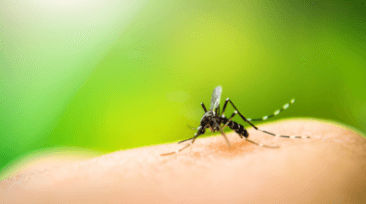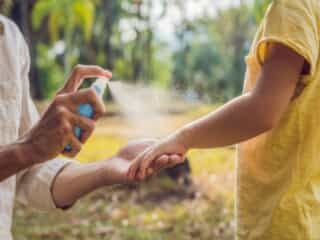It is officially mosquito season in the Coastal Empire! With the onset of warmer weather, most of us are busy planning trips to parks, the beach, and organizing outdoor socially distanced gatherings – giving little thought to the devil dressed as a mosquito. Mosquitoes are not only just pesky creatures that we all hate. They are incredibly dangerous bloodsucking beasts that not only spread disease but can cause fever, diarrhea, dengue (breakbone fever), and even death! As adults we can use some mosquito control techniques to protect and save ourselves from their bites. Now imagine your newborn or young child struggling to dodge their dreadful bites with limited mobility and no knowledge of their biting ability.

As a parent, we are always worried about keeping our kids out of the path of these annoyingly dangerous insects. When it comes to using bug repellents, even when the label says DEET free they are not safe to use on newborns and/or kids under 2 months. So … what are some of the most effective ways to keep mosquitoes at bay while also ensuring our kids are safe from chemicals?
Prevention is always better than a cure. When it comes to mosquito control, we recommend the following:
#1: Keep Your Kids Inside During Dawn and Dusk
Mosquitoes bite at all hours of the day, however their prime feeding times are during dawn and dusk. Do your best to avoid spending time with your kids outside during these times, as their risk of an uncomfortable encounter with mosquitoes is extremely high. However, if being outside during these times is unavoidable, do you best to take appropriate precautions to keep the mosquitoes at bay.
#2: Choose Your Mosquito Repellent Wisely

As per the American Academy of Pediatrics, chemical repellents should not be used on newborns or kids 2 months or younger. Because chemical repellants stay on for a longer duration, they are a practical choice for many parents for keeping mosquitoes away. However, when making a purchase read the label carefully and check all the repellent ingredients. If you do decide to use chemical mosquito repellent, please keep the following health tips in mind:
- Use an insect repellent with a DEET concentration of no higher than 30 percent.
- When applying DEET repellants on older infants, do not use the product on cuts or around the eyes or mouth. Apply very lightly around the ears.
- Do not use a combination sunscreen/DEET product. These require you to reapply the product frequently which could be harmful to your child.
- Apply just enough repellent to cover your child’s skin. Do not over-apply.
#3: Try Essential Oils and Natural Repellents
Chemical repellants not your thing? Lucky for you there are plenty of repellents on the market that are all-natural and chemical-free. Another option is essential oils – local stores are filled with scents and oils that effectively keep the mosquito buzz away from your kids. The oil from lemon eucalyptus is one such effective repellent you can use to wade off the mosquitoes. Vanilla essence, lavender oil, and menthol camphor are some other products you can use to defend your child from these dangerous creatures.
Keep in mind that all-natural and chemical-free repellents’ effect lasts for 1-2 hours only. They also should not be used as an overnight solution. If you choose to go this kid-safe route, remember …
- If you are taking your child outside, apply sunscreen before applying the repellent – and make sure it dries before applying repellent.
- You can dab essential oil under your child’s ears and on their wrists for effective mosquito control.
#4: Dress Your Child Well
One of the most effective ways to protect your child from mosquito bites is to minimize skin exposure. Mosquitoes can easily bite through thin and skin fitted clothing, so it helps if you chose thick and loose-fitted clothes for your kid. Also, dark colors tend to attract bugs and mosquitoes, so if taking your child for a stroll or playing outside dress yourself and your child in light-colored clothing. If you have an infant, cover their baby carrier with a mosquito net when outside during mosquito season (March – October in our area).
#5: Remove Standing Water
Standing water is a breeding ground for mosquitoes – it is literally where they lay eggs. It only takes around 7-10 days for mosquito larvae to turn into a full-grown bloodthirsty mosquito, so eliminating things and areas where water could easily get lodged decreases your risk of infestation. Any area that can collect water makes a perfect breeding ground for mosquitoes – old tires, buckets, birdbaths, planters, flowerpot saucers can easily collect water and become a favorable home for mosquitoes.
At least once a week, empty/scrub/turn over/cover/recycle any item(s) that hold water, and do not let your kid(s) congregate or play in or near these areas/items.
#6: Hire a Professional
It is always wise to let professionals take charge and deliver safe and highly effective mosquito control services. Our certified technicians know the best ways to fog your yard to save you and your beloved kids from being the prey of these thirsty creatures. Our monthly Mosquito Control Program runs March – October and effectively penetrates mosquito breeding areas and helps protect your yard… and your family… from aggravating and itchy mosquito bites. How does it work? Read on …
Our technicians utilize a mobile backpack system that allows them to gain access to the thickest foliage and other nooks and crannies where mosquitoes breed. A thin mist is applied that establishes an effective barrier to mosquito reproduction.
Treating Mosquito Bites in Children
Mosquitoes do not differentiate between adults and kids, so even when you try your hardest to protect your family from these pesky creatures they still may bite. If your child does get bitten by mosquitoes, try these treatment recommendations to keep discomfort at bay:
- Divert Swelling: If you happen to catch a mosquito in the act of munching on your child, brush it off gently with a sweep of your hand. Immediately apply ice to the scene of the crime to help prevent itching and swelling.
- Discourage Scratching: Explain to your child that scratching or picking will make the bug bite worse and trim their fingernails as short as possible. Sharp fingernails can break the skin around the bite and let bacteria in. This increases risk for infection. If your child is so young that they will not understand why they should not scratch, place thin mittens on their hands to help head off scratching.
- Ease Itching: Hydrocortisone cream and calamine lotion are both safe for children – they even come in “kids” versions. Use either to treat the bite as needed and to provide some welcome relief to your child.
- Keep an Eye Out For Symptoms of Illness: Mosquitoes easily carry/transport disease – in particular, West Nile virus. The CDC recommends all parents be familiar with the symptoms, which include:
- Fever
- Headache
- Nausea
- Vomiting
- If your child experiences any of these symptoms, check in with their pediatrician and mention that they have been bitten by mosquitoes. Also keep an eye out for signs of infection due to your child scratching or picking at the bite. These signs include:
- Redness
- Swelling or puss
- The area around the bite feeling warm to the touch.
The best way to protect your children from infectious mosquitoes is to look to the professionals. Although there are some DIY methods and ideas that will help keep these buzzing creatures at bay, the best solution is to contact us today and let us help!
